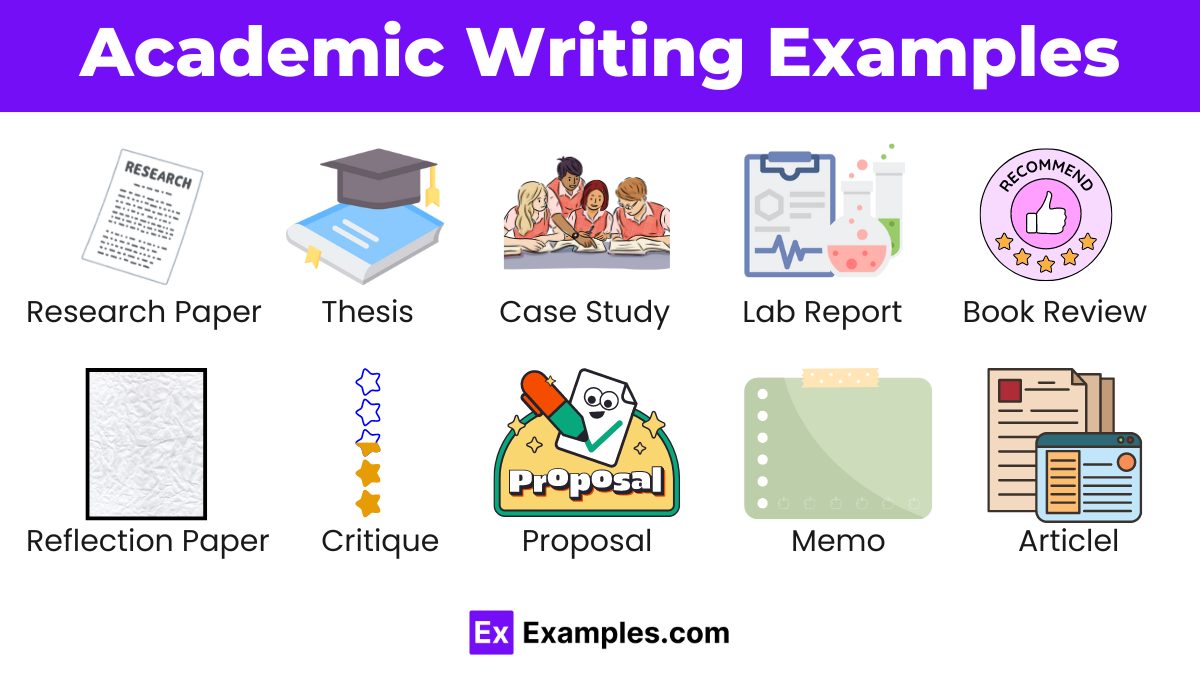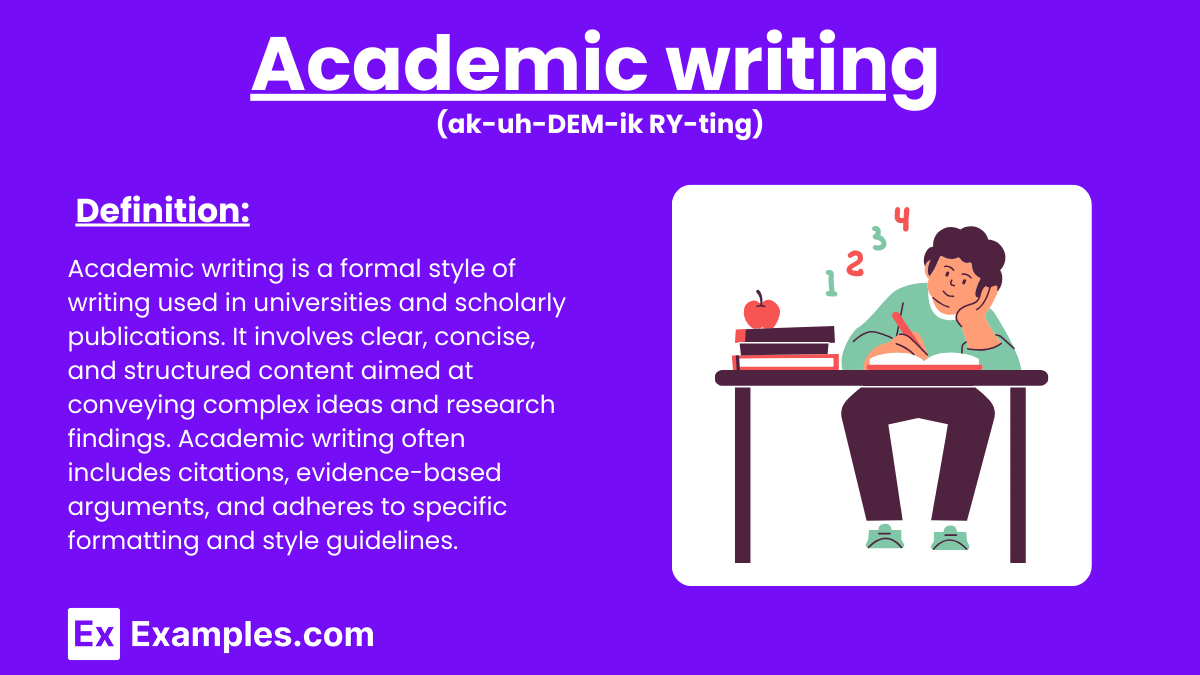18+ Academic Writing Examples
An analytical essay dissects a subject, evaluates its components, and presents a well-reasoned analysis. This type of essay requires critical thinking and a clear argument, supported by evidence. It involves examining themes, motifs, and various elements to understand the work deeply. Writing an analytical essay involves interpreting facts rather than summarizing them, making it essential for students to hone their analytical skills. Understanding the structure and purpose of an analytical essay is crucial for academic success.
What Is Academic Writing?
Academic writing is a formal style of writing used in universities and scholarly publications. It is characterized by clear, concise, and evidence-based arguments. This type of writing follows specific conventions, including proper citation and a structured format, to communicate complex ideas effectively.
Academic Writing Examples

- Research Paper – In-depth study presenting original research and analysis.
- Essay – A structured argument on a specific topic is essential in an analytical essay. This type of essay requires presenting a clear thesis and supporting it with well-organized evidence and analysis.
- Dissertation – Extensive research project for a doctoral degree.
- Thesis – Research paper for a master’s degree.
- Case Study – Detailed examination of a particular case.
- Lab Report – Documentation of an experiment and its results.
- Literature Review – Summary and evaluation of existing research.
- Annotated Bibliography – List of sources with summaries and evaluations.
- Book Review – Critical assessment of a book.
- Conference Paper – Presentation of research at a conference.
- Journal Article – Scholarly article published in an academic journal.
- Position Paper – Argument supporting a particular viewpoint.
- Reflection Paper – Personal response to a specific experience.
- Critique – Detailed analysis of a text or work.
- Report – Structured document presenting information on a specific topic.
- White Paper – Authoritative report providing information or proposals.
- Proposal – Plan or suggestion put forward for consideration.
- Memo – Brief communication within an organization.
- Review Article – Summary and synthesis of research on a topic.
- Personal Statement – Essay outlining an individual’s qualifications and goals.
Types of Academic Writing
- Article Writing: Crafting informative, engaging, and well-researched article writing for journals, magazines, or online platforms.
- Ghost Writing: Crafting content as a ghostwriting on behalf of someone else, often for books, articles, or speeches.
- Formal Writing: Formal writing is structured and professional writing used in academic, business, or official contexts.
- APA Writing: Writing style adhering to the American Psychological Association guidelines, commonly known as APA Writing, is used in social sciences.
- Descriptive Writing: Vividly detailing subjects to create a clear picture for the reader.
- Analytical Writing: Breaking down complex ideas or arguments to evaluate and interpret them.
- Persuasive Writing: Convincing the reader of a particular viewpoint or argument.
- Critical Writing: Evaluating and analyzing texts or ideas to form a reasoned judgment.
Academic Writing Skills
- Critical Thinking: Analyze and evaluate information to form reasoned judgments and arguments.
- Research Skills: Locate, evaluate, and synthesize information from various sources to support your writing.
- Planning and Organization: Structure your writing logically with clear introductions, body paragraphs, and conclusions.
- Clarity and Precision: Express ideas clearly and accurately to avoid ambiguity and confusion.
- Grammar and Punctuation: Use correct grammar, punctuation, and sentence structure to enhance readability.
- Referencing and Citation: Properly cite sources to give credit and avoid plagiarism.
- Argument Development: Construct well-supported arguments with evidence and logical reasoning.
- Editing and Proofreading: Review and refine your writing to correct errors and improve clarity and style.
Characteristics of Academic Writing
- Formal Tone: Academic writing uses a serious and formal tone, avoiding slang and colloquialisms.
- Clear and Concise: Ideas are expressed clearly and concisely, eliminating unnecessary words and complexity.
- Evidence-Based: Arguments are supported by credible evidence, including data, research, and citations.
- Objective: Writing maintains an objective stance, avoiding personal bias and subjective opinions.
- Structured: Follows a structured format with a clear introduction, body, and conclusion.
- Technical Vocabulary: Utilizes specific terminology relevant to the academic discipline being discussed.
7 Categories of Academic Writing
- Descriptive Writing – Describes concepts, events, or objects, providing detailed information in an academic essay.
- Analytical Writing – Breaks down information into components, examining and interpreting them.
- Persuasive Writing – Presents arguments to convince the reader of a particular viewpoint.
- Critical Writing – Evaluates and analyzes texts or theories, often comparing different viewpoints.
- Reflective Writing – Explores personal experiences and insights related to academic topics.
- Expository Writing – Explains or informs about a topic, providing clear and factual information.
- Creative Writing – Uses imaginative narrative techniques to explore academic topics creatively.
Importance of Academic Writing
- Communication of Ideas: Academic writing effectively communicates complex ideas and research findings clearly and precisely.
- Critical Thinking: It encourages critical thinking by requiring analysis, evaluation, and synthesis of reference information.
- Knowledge Dissemination: Facilitates the spread of knowledge and advancements in various fields through published research and papers.
- Academic Success: Essential for academic success, contributing to better grades and scholarly recognition.
- Professional Development: Enhances professional development by improving writing, research, and analytical skills.
- Standardization: Provides a standardized method for presenting research, ensuring consistency and credibility.
Academic Writing Tips
- Plan Your Work – Outline your main points and structure before writing.
- Understand Your Audience – Tailor your language and arguments to the intended readers.
- Use Clear and Concise Language – Avoid unnecessary jargon and complex sentences.
- Develop a Strong Thesis – Make sure your central argument is clear and well-defined.
- Support Arguments with Evidence – Use credible sources to back up your claims.
- Cite Sources Properly – Follow the required citation style to avoid plagiarism.
- Stay Objective – Focus on facts and logical reasoning rather than personal opinions.
- Revise and Edit – Review your work for clarity, coherence, and grammatical accuracy.
- Use Topic Sentences – Start each paragraph with a clear main idea.
- Seek Feedback – Have peers or mentors review your work for additional insights.
Why is academic writing important?
It helps develop critical thinking, clear communication, and strong argumentation skills.
What are common types of academic writing?
Common types include essays, research papers, theses, and dissertations.
What is the purpose of academic writing?
The purpose is to inform, argue, and contribute to scholarly conversations.
How is academic writing different from other writing styles?
It is more structured, formal, and evidence-based compared to other styles.
What is APA writing?
APA writing adheres to the guidelines of the American Psychological Association, used mainly in social sciences.
What should be avoided in academic writing?
Avoid informal language, unsupported claims, and plagiarism.
How do you cite sources in academic writing?
Sources are cited using specific formats like APA, MLA, or Chicago style.
What is the structure of an academic essay?
An academic essay typically includes an introduction, body paragraphs, and a conclusion.
What are the characteristics of a good thesis statement?
A good thesis statement is clear, concise, and presents a strong argument.
How can one improve their academic writing skills?
Practice regularly, seek feedback, and read extensively in your field.



